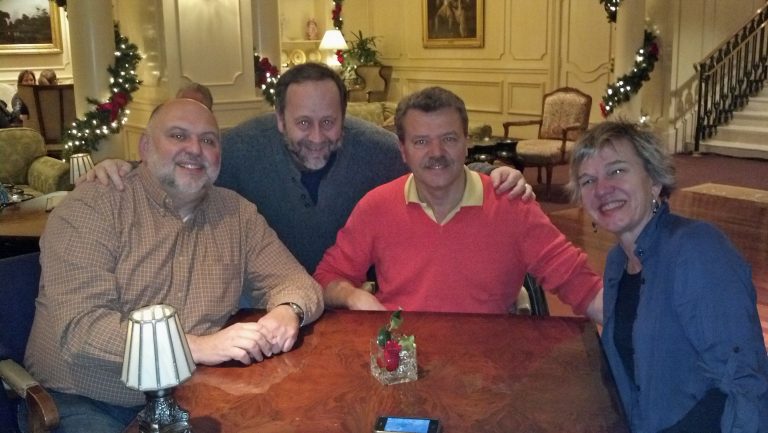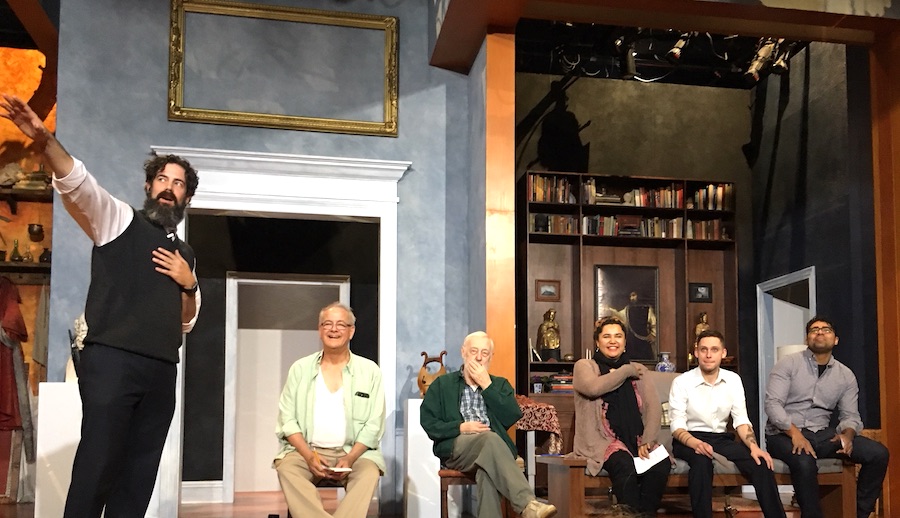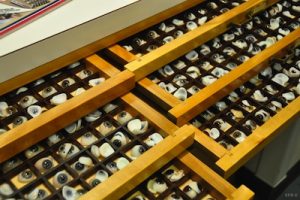My writers have kept some good company
October 28, 2017 • 5 Comments • Posted in book tour, careers/jobs for people who are blind, guest blog, memoir writing, public speaking, writing, writing promptsWhitney and I gave a presentation at Bethany Retirement Community yesterday. Bethany sponsors a weekly memoir-writing class for residents there, and yesterday’s event began with a lovely reading of short pieces six of the writers in their class had written. Each participant had provided photos. While staff members read the essays aloud, the photos that went with that particular essay appeared on a big screen so audience members could see what the characters in each story looked like. What a great idea!
My short presentation came afterwards, and during the Q&A portion I was asked, “You’ve been leading your memoir classes all these years, of all the stories you’ve heard, is there one that is your favorite?”
I was stumped. No one had ever asked that question before. The room fell silent. Oodles of stories started swimming around my head, so, so many good stories. Which one to pick? And then, of all things, I remembered reading in Writer’s Almanac that yesterday was the birthday of famous poet and novelist Sylvia Plath. She would have been 85, and a writer in one of my memoir-writing classes knew her in college.
“I get a kick out of hearing about some of the famous people the writers knew way back when,” I said, finally breaking the silence. ”It kills me how nonchalant they can be about knowing famous people.” I’ve talked about some of those writers here on the Safe & Sound blog:
- 80-year-old hair stylist Bob Eisenberg shared a cocktail (or two, or three) with Vidal Sassoon.
- At an Antioch College reunion, Judy Spock reunited with her friend Corrie Scott, whose married name was Coretta Scott King.
- Regan Burke moved to Little Rock to work as Bill Clinton’s scheduler during the 1992 campaign and moved to D.C. to work there after he won.
- And of course Wanda Bridgeforth sang in high school musicals with Nat King Cole and Dinah Washington.

Haven House at Smith College.
And then there’s Giovanna Breu. She worked for Life Magazine after graduating from Columbia University’s School of Journalism and, before that, from Smith College. “I did not pick my college. My mother did,” Giovanna wrote when I assigned “Choosing a College” as a writing prompt. Her essay pointed out that back then prestigious colleges like Harvard, Yale and Princeton did not admit women. “The argument was that women would lower their academic standards.”
Her mother had attended Smith, a women’s college, and loved her time there so much she wanted both daughters, Giovanna and Diana, to go there. “I suppose I could have objected and headed in a different direction, but I was young, only 16 when I was graduated from high school, the first of my siblings to go away to college.”
Giovanna lived at Smith’s Haven House all four years. “My mother said I should pick Haven House because it was where she lived, and she loved it.” A three-story frame house built in 1865, Haven House was painted bright yellow on the first two floors, white across the top, with windows flanked by black shutters. “A porch, held up by slim columns, enlivened the front of the house,” Giovanna wrote, describing other side porches stretching back into the college’s grassy campus as well. “On sunny days we’d dress in our shortest shorts and stretch out on the porches trying to get a tan.” The last paragraph of Giovanna’s essay is a perfect example of how nonchalant these writers can be about the famous people they hung out with when they were younger:
The rooms at Haven were different configurations. I lived on the first floor with a roommate my freshman year, and then in a single room, part of a suite, for the next three years. When I was a senior my room was directly across from a freshman named Sylvia Plath. That is another story.
I shared Giovanna and Sylvia Plath’s story with my audience at Bethany, they asked a few more questions about memoir, and when the event was over we gave each of the six writers whose work had been featured at the beginning of the talk a copy of my book Writing Out Loud as a gift. Four more copies were given to Bethany’s library for other residents — and their visitors — to read. As I put on my coat to leave, Bethany staff members told me a lot more residents were already talking about joining Bethany’s memoir-writing class now. I call that an unqualified success!




